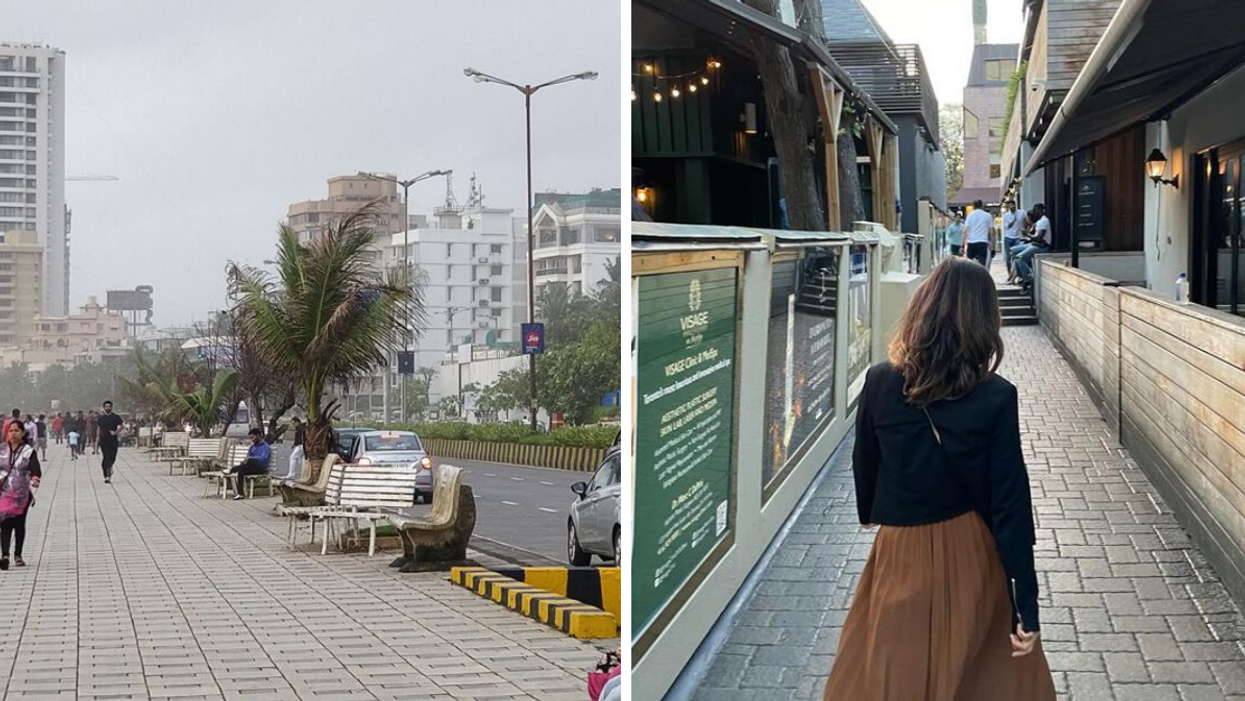I've Lived In Both Mumbai & Toronto — Here's How The Two Major Cities Compare
Life couldn't be more different...

A street in Mumbai. Right: Janice Rodrigues in Downtown Toronto.
The opinions expressed in this article are the author's own and do not necessarily reflect the views of Narcity Media.
If you've ever wondered how living in a big city in India compares to living in a big city in Canada, read on!
I've had the pleasure of living in many countries around the world, and that includes three years that I spent in Mumbai, India's largest city.
Looking back, I can't help but think about how life there couldn't be more different to my current life in Toronto.
Sure, both are big, thriving cities so they do have loads in common, including being absolute party hubs, having great food and impressive job opportunities.
However, I can't help but feel like the differences far outweigh the similarities.
While I'm by no means trying to pit the two cities against each other, I couldn't help but think about the many things that make life unique in these two cities.
The weather
Mumbai is hot. In summers, the temperature goes up to mid-30 C.
Granted, Toronto summers get quite hot too. But, because Mumbai is so humid, the temperature there feels a lot muggier.
Moreover, Toronto summers are quite short-lived comparatively, with a major chunk of the year having freezing temperatures.
In Mumbai, the coolest it will get is 15 C to 20 C, so that's actually the best time to visit. You also don't need to spend a fortune on winter gear to deal with that.
The cost of living
The cost of living in Mumbai and Toronto, well, just can't be compared.
Things are just much, much cheaper in Mumbai.
To put it in context, the comparison website Numbeo says that the cost of renting a one-bedroom in Mumbai's city centre is about INR₹40,583 per month… which is CA$674. Get it now?
Other things that are almost ridiculously cheaper are groceries, the cost of meals out, internet expenses and transportation costs (but more on some of those later).
However, Canadians can take respite in the fact that Mumbai salaries correlate to this lower cost of living too.
The average Mumbaiker earns approximately CA$840 per month, as compared to Toronto's average of CA$4,368, according to Numbeo.
The food
I'll be honest and say that I love both Mumbai and Toronto's food scene, just in very different ways.
Toronto has a truly diverse range of fusion foods and, honestly, nothing can beat its hold on bubble tea and ramen.
Meanwhile, where Mumbai really thrives is Indian street food. Things like pani puri, pav bhaji, samosa, dosa, and vada pav are readily available, absolutely delicious (if you can handle the spice) and ridiculously cheap.
The languages
While here in Toronto you do hear many languages, English is still usually the most common.
However, in Mumbai, you'll hear an array of languages spoken when out and about. Many people are well-versed with English, but Hindi and Marathi are more widely spoken.
You can't discount other Indian languages and dialects either. Being bi-lingual and multi-lingual is very common there.
My grandmother who lived there, in fact, spoke five languages, a skill she sadly did not pass on to me!
The crowds
I know that all big cities are pretty busy. But, if you think Toronto is crowded, Mumbai is on a whole new level.
Mumbai is so crowded that during peak hours it can feel like you're in a sea of people.
This all comes down to its population density, with Mumbai regularly listed among the most population-dense cities in the world.
According to Statista, it's the 11th most population-dense city globally, with 25,577 inhabitants per square kilometre.
Because of this, people have a different definition of personal space there too.
So, if you're not a fan of feeling packed in, stay away from Mumbai's most popular spots during peak hours.
The trains

Janice Rodrigues on a TTC train.
The Mumbai local trains should be used with a touch of caution.
While it's incredibly well-connected and cheap (a monthly train pass is just CA$6 compared to Toronto's CA$156, according to Numbeo), it can be a challenge.
Again, because of the crowds, the trains are often so packed that people are hanging on outside of a moving train (and yes, that is incredibly dangerous).
There are separate women's compartments too, but those are also incredibly busy. My best piece of advice on taking the train during rush hour would be, well, brace yourself.
That being said, I've always been in awe of how punctual the Mumbai local trains are. And, with multiple lines, the railway lines' reach is much wider than the TTC.
The buses, rickshaws and Uber rides are also great, and offer real value for money.
The pollution
There are a lot of things I love about Mumbai, but the pollution is not one of them.
The city regularly ranks amongst the most polluted cities in the world, with air quality being a big problem.
The population density would be a major reason. But, if I had to compare it to Toronto in this regard, there is a clear and obvious winner in the cleanliness scale.
The conveniences
The cost of labour is cheaper in Mumbai and that means that people are just offered more conveniences in certain regards.
It's very normal, for instance, for a middle-class income family to have help when it comes to cleaning the house or cooking.
Getting your groceries delivered home is also very common. So, if you enjoy those little creature comforts, Mumbai is definitely a touch above Toronto, provided you have the funds.
In the end, the experience of living in these two cities has been so different and yet so enjoyable for me.
I definitely miss a lot about Mumbai, from its hustle and bustle, and its incredibly fresh (and cheap) groceries, to the impressive monsoon season.
But, ever since I moved to Toronto, I've made an effort to explore all this city has to offer and there's just so much I love about it, from actually seeing the seasons change to exploring the incredible natural beauty.
No city is perfect. There are pros and cons, and sometimes it's just all about appreciating the best parts of them and going with the flow!
This article's left-hand cover image was used for illustrative purposes only.